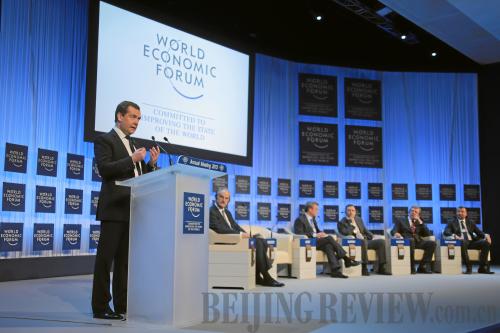|
 |
|
GUARDED OPTIMISM: Russian Prime Minister Dmitry Medvedev delivers a speech at the World Economic Forum Annual Meeting 2013 in the Swiss resort of Davos on January 23 (XINHUA) |

The World Economic Forum Annual Meeting 2013 held in Davos, Switzerland, on January 23-27, focused on minimizing risks and boosting the resilience of economies and societies, promoting a theme of "resilient dynamism" in an event that reflected on major concerns regarding a perceived slowdown in economic growth and a constrained recovery.
Rickety recovery
Entering the new year, people around the world have been anticipating what is in store for the world economy. Several major international organizations have released their own forecasts of 2013 global economic growth over the past months, with the IMF predicting 3.6 percent, the UN 2.4 percent and the World Bank's latest figure at 2.4 percent. The forecasts may not be perfectly accurate, but they hint at three developing trends.
First, economic growth this year will not return to the normal pace prior to the global economic crisis of around 4 percent. It shows that the crisis is still ongoing and the world economy remains in a recovery phase.
Second, the driving force behind the economic recovery is weakening. On the one hand, forecasting figures from leading world economic organizations for this year are universally lower than the 2011 growth rate, a sign of the slackening impetus for world economic growth. On the other hand, revising economic growth to lower expectations has been common in recent years. The gradual downplaying of prospects for the global economy is another signal for the softening of economic growth. Goldman Sachs' Global Leading Indicator and "Swirlogram" framework also confirmed the belief that the world economy is slowing.
Third, benefits from anti-crisis policies are diminishing in almost all countries, while prospects for a natural recovery of the world economy remain weak. Since 2010, world economic growth has mostly relied on the stimulation of new monetary and fiscal policies. However, the effect of policy stimulus is limited. The marginal effect of economic growth brought by the stimulation is decreasing. So far, there have not been new technologies or institutional reforms that can unleash economic vitality in place of governmental power. In 2013, it is unlikely for the world economy to achieve a great rebound.
Negative competition
The steady growth of the world economy requires not only strong impetus but also a stable development environment. However, governments around the world have made little contribution to this as the financial crisis goes into its sixth year. On the contrary, the world economy has demonstrated its characteristic vulnerability. Last year, international coordination for world economic policies was shelved while general elections gripped the political activity of countries accounting for more than half the world economy. Therefore, political leaders have shifted their focus from international to internal affairs. The policies they advocate tend to aim at winning voters instead of maintaining steady global economic growth, adding to the difficulty for the implementation of anti-crisis policies while further provoking protectionism.
In the next couple of years, the global political landscape should stabilize. Nonetheless, having missed the opportunity for international coordination in 2012, the world economy in 2013 will suffer the consequences. Major countries will grapple with aggravated negative economic competition; international trade disputes will become fiercer with the risk of trade war on the rise; the fight for international financial rights will continue; major currencies will compete for devaluation; and, despite a low probability of currency wars, the resulting cost of financial volatility will be high.
| 